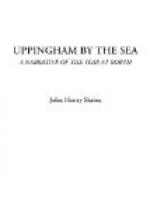It pleases the smaller kind of criticism to cheapen the meaning of such incidents as this, and explain them by the easy reference to interested and conventional motives. Wiser men will take occasion to rejoice that human nature is after all so kind; and if this be error, we would rather err with the wise. Take once again our thanks, kind people of Borth, if our thanks are worth your taking. You showed us no little kindness in a strange land, and the day is far off when we shall forget the friendly, gentle people whose name is the memorial of a great ill escaped, of much good enjoyed, in the days that are over, and the landmark of who knows what greater good in the days that are to be.
CONCLUSION.
Perhaps poetry and romance are as plentiful as ever in the world, except for those phlegmatic natures, who, I suspect, would in any age have regarded them as a dull form of erroneous thinking. They exist very easily in the same room with the microscope, and even in railway carriages: what banishes them is the vacuum in gentleman and lady passengers. How should all the apparatus of heaven and earth, from the farthest firmament to the tender bosom of the mother who nourished us, make poetry for a mind that has no movements of awe and tenderness, no sense of fellowship which thrills from the near to the distant, and back again from the distant to the near?
GEORGE ELIOT.
[Greek verse]
ANTIGONE.
All is over now; April was just a twelfth-night old when the school departed. Some of our company have lingered on for business, a few from reluctance to have done with it. But to-day the last group has taken wing for the Midlands. Old “Borth,” the colley dog, followed them to the station, and poked his nose into the carriage to take his leave. Old Borth—we had almost forgotten him, and that had been deep ingratitude for he was not the least warm-hearted of our friends in Wales. His master lived two miles away; but soon after our arrival, Borth had come down from the hills to attach himself to our fortunes, and henceforth became, as it were, our familiar, the pet of the regiment, like the goat of the “23rd.” He knew his position, and was a stickler for formalities; he had a wag of the tail for every boy who wore the image of the venerable schoolmaster upon his cap; but if he met him bare-headed, or, by any chance, in an indistinctive head-gear, he would cut that boy dead, were he never so much the same urchin from whose hand he had yesterday eaten a cheese-cake. That was his official rebuke for the irregularity. By day, Borth would bask in some sunny corner of our quarters; at night, he has been known to venture on a nearer intimacy where doors were left open. We found you once ourselves, Borth, curled up and asleep upon our own bed. You woke up, shook yourself with a modest, but not startled manner, and walked quietly away, like a gentleman.




